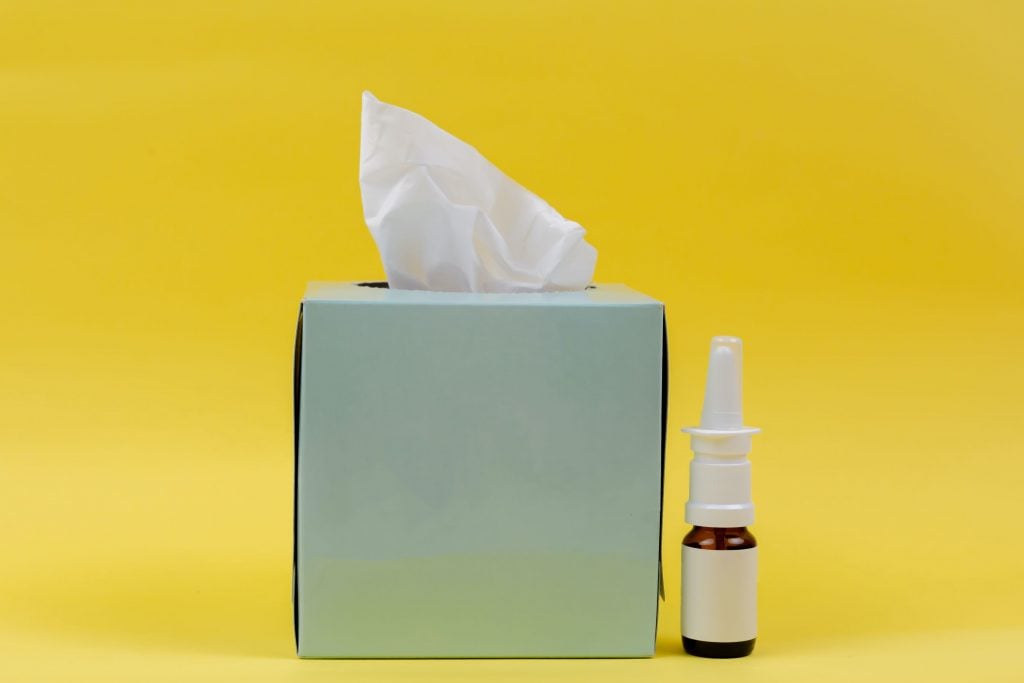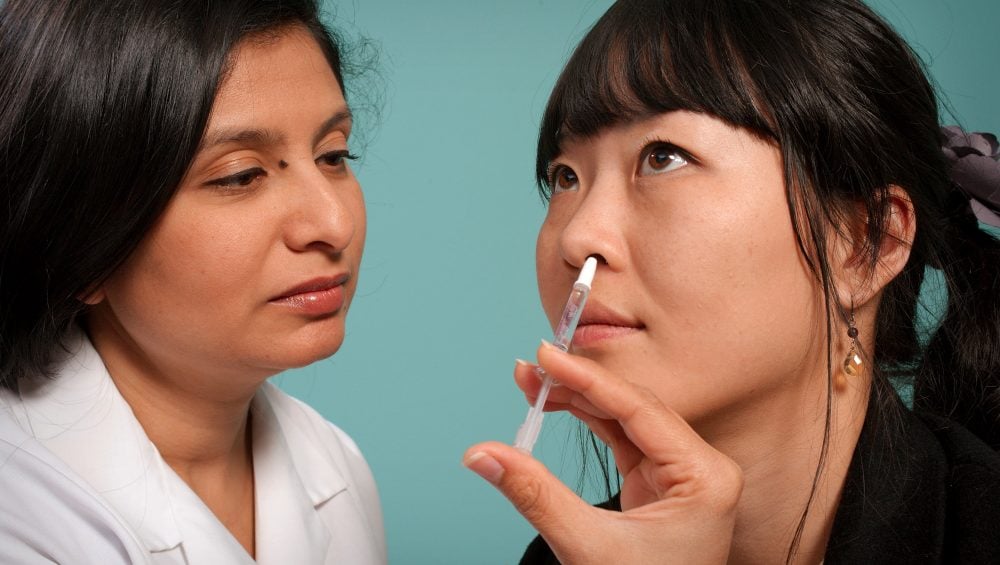A nasal spray, according to experts, would tackle the novel coronavirus at the site of entry into the body.
A nasal spray vaccine against COVID-19, according to researchers, maybe the most effective strategy to combat the novel coronavirus.
Because the virus normally enters the human body through the nose, a spray would target the invader there.
Currently, nasal sprays are used in seven of the 100 COVID-19 vaccinations in clinical testing.
Because SARS-CoV-2 is a respiratory virus, it prefers to enter the body through the nose. Nasal swabs are used in testing for the new coronavirus.
But, if that’s the case, why do we give individuals an injection in the arm instead of a nasal spray to protect them from COVID-19, an illness caused by a coronavirus infection?
Nasal sprays can be used to protect against COVID-19, and numerous such vaccines are now in development.
Dr. Troy Randall, an inflammation, immunology, and immunotherapeutics researcher at the University of Alabama at Birmingham, told Healthline, “One of the big selling points would be that intranasal vaccines are needle-free, and there is a big population of people who are freaked out by getting a needle stick.”
Because [the novel coronavirus] is a respiratory virus, he continued, “having an antibody response in the nose is certainly a better model.”
Randall and another researcher Frances Lund co-authored an essay on the potential benefits of an intranasal COVID-19 vaccine that was published in Science magazine.
A Different Response of Immunity
Using a nasal spray to administer immunizations is not a novel concept.
Since 2003, FluMist, a nasal influenza vaccination, has been on the market.
However, just seven of the nearly 100 COVID-19 vaccines now in clinical studies are nasal sprays. In addition, all COVID-19 vaccinations currently licensed for use are administered intramuscularly.
In recent decades, immunologists have discovered that the immune response to infections takes place not only throughout the body but also locally, such as in the mucous membranes of the nose and throat.
“You have to inject the vaccine at the illness site to achieve that particular response,” Randall explained.
The goal is to kill the coronavirus while it’s still in the nose before it spreads throughout the body.
He explained, “You prevent the infection from gaining a foothold.” “A nasal infection isn’t going to kill you, but an inflammatory immune reaction in the lungs could.”
Vaccine shots, whether they use cutting-edge mRNA technology or a form of neutralized coronavirus, provide an immune response across the body, but only a modest reaction in the mucosal lining of the nose, where the majority of SARS-CoV-2 infections begin, according to Randall.
Intranasal vaccinations, on the other hand, are effective at the site of injection but not necessarily so systemically, according to him.
“From a public health standpoint, it could make sense for everyone to get the shot in the arm first, and the booster shot to be the intramuscular one,” Randall proposed so that a significant immune response is established both locally and systemically.
In addition to providing a barrier to infection, a vaccine that activates immunoglobulin A and resident memory B and T cells in the nasal passages and upper airways would minimize coronavirus transmission by inoculated patients with a mild case of COVID-19.
Suggested Read: First Oral Drug Against Coronavirus
Hurdles of Nasal Spray Method
Making successful COVID-19 nasal vaccinations, according to Randall, is difficult.
The most efficient COVID-19 vaccines on the market today are based on cutting-edge mRNA technology and include only pieces of a surface protein from the target SARS-CoV-2 virus, rather than a whole live or dead virus.
FluMist, on the other hand, gives a dose of live influenza virus that has been attenuated (or weakened). This is because “it has to infect cells to work,” according to Randall.
The COVID-19 nasal vaccinations that are currently being similarly researched act.
Using live attenuated virus as a vaccine is an older technology that has the potential to cause infection and disease in some people.
If the receiver has previously experienced the flu, the vaccination’s effectiveness may be restricted, as previously developed immunity may destroy the vaccine before it can be recognized as a new strain of the disease.
A nasally delivered mRNA-based vaccine, according to Randall, is possible, but it would likely necessitate changes to the coronavirus spike protein nanoparticles currently used in injectable COVID-19 vaccines.
“It needs to be made in such a way that it will be taken up by nasal epithelial cells and elicit an immunological response,” he said.
Eight Nasal Sprays to Undergo Trials

Clinical trials to test eight nasal spray vaccinations that target COVID-19 are now underway, according to the World Health Organization (WHO).
China’s Xiamen University, the University of Hong Kong, and Beijing Wantai Biological Pharmacy have completed phase 2 trials, which is the most advanced attempt thus far.
“The virus usually enters through the nose,” said researcher Nathalie Mielcarek, who is collaborating with the Lille Pasteur Institute to develop a whooping cough nasal spray vaccine.
“The plan is to close the door,” says the narrator.
Antibody Triggers
In a March article in Scientific American, it was suggested that nasal spray vaccines be developed since they have a rapid effect on the virus in sick people’s mucus.
They cause the development of immunoglobulin A, an antibody that can prevent infection.
According to the article, “this overwhelming response, known as sterilizing immunity, minimizes the risk of people passing the virus on to others.”
The existing COVID-19 vaccinations provide excellent protection against severe versions of the virus, but they are less effective at preventing the virus from spreading.
Mielcarek claims that stimulating immunity directly in the nose reduces the danger of infecting others.
“From there, the virus infects the lungs less, resulting in fewer severe cases since the viral load is lower,” she noted.
No Refrigeration needed
Other benefits, according to a March article by Gavi the Vaccine Alliance, include the fact that the sprays don’t need to be refrigerated and don’t need to be administered by health experts.
According to the report, “people would be able to self-administer them at home,” and “they are likely to be more popular for the millions of individuals who dislike needles.”
In a recent French trial on mice, 100 percent of those immunized with the spray survived COVID-19 infection, whereas all unprotected animals died.
“The vaccinated animals… exhibited minimal levels of the virus, therefore they are not contagious anymore,” Philippe Mauguin, CEO of the French institute that aims to patent the vaccine, told Agence France-Presse (AFP).
The study’s leader, Isabelle Dimier-Poisson, is optimistic.
“It may allow us to return to life as it was before the pandemic, without social isolation and masks,” she said.
Suggested Read: COVID Vaccine Guide: Everything you need to know

